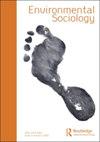Environmental public interest litigation: new roles for civil society organizations in environmental governance in China
IF 2.4
Q3 ENVIRONMENTAL STUDIES
引用次数: 6
Abstract
ABSTRACT In 2015, the Government of China enacted Environmental Public-Interest Litigation (EPiL) as an amendment to its revised Environmental Protection Law. This policy granted civil organizations standing in court to represent public interests applied to environmental values. Based on a review of EPiL developments since 2015 and a case study focused on soil pollution litigation pursued by a leading environmental non-governmental organization (NGO), this paper analyzes the contemporary dynamics of Chinese environmental governance and strategies through which NGOs are leveraging EPiL to advance policy change. Through critical engagement with the concepts of experimentalist governance, this paper highlights the complex pathways through which empowerment of civil society organizations produced policy shifts. Rather than focusing on information and learning derived from purposive experimentation, this study highlights how entrance of new actors introduced practical knowledge and new values that catalyzed an array of changes in governance arrangements. While the metaphor of experimentation suggests a system that is well understood and subject to controls, we identify substantial indeterminacy and openness in governance.环境公益诉讼:民间组织在中国环境治理中的新角色
2015年,中国政府对修订后的《环境保护法》进行了修订,制定了《环境公益诉讼条例》。这项政策允许民间组织在法庭上代表适用于环境价值的公共利益。本文回顾了2015年以来EPiL的发展,并以一家领先的环境非政府组织(NGO)的土壤污染诉讼为例,分析了中国环境治理的当代动态,以及非政府组织利用EPiL推动政策变化的策略。通过对实验主义治理概念的批判性接触,本文强调了公民社会组织赋权产生政策转变的复杂途径。本研究没有关注从有目的的实验中获得的信息和学习,而是强调了新参与者的进入如何引入实用知识和新价值观,从而催化了治理安排中的一系列变化。虽然实验的比喻暗示了一个很好理解并受控制的系统,但我们确定了治理中的实质性不确定性和开放性。
本文章由计算机程序翻译,如有差异,请以英文原文为准。
求助全文
约1分钟内获得全文
求助全文
来源期刊

Environmental Sociology
ENVIRONMENTAL STUDIES-
CiteScore
4.60
自引率
12.00%
发文量
34
期刊介绍:
Environmental Sociology is dedicated to applying and advancing the sociological imagination in relation to a wide variety of environmental challenges, controversies and issues, at every level from the global to local, from ‘world culture’ to diverse local perspectives. As an international, peer-reviewed scholarly journal, Environmental Sociology aims to stretch the conceptual and theoretical boundaries of both environmental and mainstream sociology, to highlight the relevance of sociological research for environmental policy and management, to disseminate the results of sociological research, and to engage in productive dialogue and debate with other disciplines in the social, natural and ecological sciences. Contributions may utilize a variety of theoretical orientations including, but not restricted to: critical theory, cultural sociology, ecofeminism, ecological modernization, environmental justice, organizational sociology, political ecology, political economy, post-colonial studies, risk theory, social psychology, science and technology studies, globalization, world-systems analysis, and so on. Cross- and transdisciplinary contributions are welcome where they demonstrate a novel attempt to understand social-ecological relationships in a manner that engages with the core concerns of sociology in social relationships, institutions, practices and processes. All methodological approaches in the environmental social sciences – qualitative, quantitative, integrative, spatial, policy analysis, etc. – are welcomed. Environmental Sociology welcomes high-quality submissions from scholars around the world.
 求助内容:
求助内容: 应助结果提醒方式:
应助结果提醒方式:


